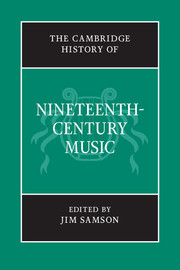Book contents
- Frontmatter
- Part One 1800–1850
- Part Two 1850–1900
- 11 Progress, modernity and the concept of an avant-garde
- 12 Music as ideal: the aesthetics of autonomy
- 13 The structures of musical life
- 14 Opera and music drama
- 15 Beethoven reception: the symphonic tradition
- 16 Words and music in Germany and France
- 17 Chamber music and piano
- 18 Choral culture and the regeneration of the organ
- 19 Music and social class
- 20 Nations and nationalism
- 21 Styles and languages around the turn of the century
- Chronology
- Institutions
- Personalia
- Index
- References
11 - Progress, modernity and the concept of an avant-garde
from Part Two - 1850–1900
Published online by Cambridge University Press: 28 March 2008
- Frontmatter
- Part One 1800–1850
- Part Two 1850–1900
- 11 Progress, modernity and the concept of an avant-garde
- 12 Music as ideal: the aesthetics of autonomy
- 13 The structures of musical life
- 14 Opera and music drama
- 15 Beethoven reception: the symphonic tradition
- 16 Words and music in Germany and France
- 17 Chamber music and piano
- 18 Choral culture and the regeneration of the organ
- 19 Music and social class
- 20 Nations and nationalism
- 21 Styles and languages around the turn of the century
- Chronology
- Institutions
- Personalia
- Index
- References
Summary
Progress: theories and discontents
During a series of articles published in the Allgemeine musikalische Zeitung in 1848, the editor J. C. Lobe expressed his misgivings about the problem of progress in music, a concept that seemed particularly urgent to the German musical press in the Year of Revolutions. In response to the slogan, ‘our age is the age of progress’, he could find only this much meaning:
a. If the phrase means, music has made more strides forward in our time than in any other, it is emphatically contradicted by a glance at the period from Haydn to Beethoven. The era after Beethoven has not made the tremendous progress of that epoch.
b. If the phrase means, our age needs to progress in music, for we no longer have works that correspond to the needs of the times and everything available is founded on tired and outmoded points of view, then this is contradicted by the flourishing world of splendid compositions by masters past and present by whom a truly musical soul can be and is delighted.
c. If the phrase means, in our age much that is mediocre, hollow and empty is being produced that should be got rid of, then we claim what was claimed in all ages and goes without saying.
I cannot find a meaning other than these three with reference to the progress of practical music in general, and none of them seems to me to justify the never-ending talk and writing about progress.
- Type
- Chapter
- Information
- The Cambridge History of Nineteenth-Century Music , pp. 285 - 317Publisher: Cambridge University PressPrint publication year: 2001

